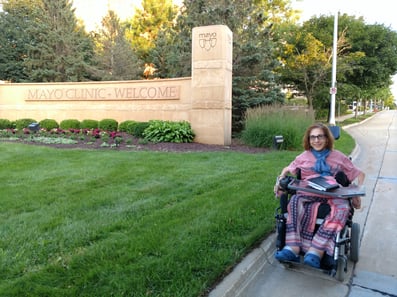Life after Spinal Cord Injury: Living with a Neurogenic - Reeve Foundation
By guest blogger Sheri Denkensohn-Trott
After 34 years of spinal cord injury (SCI) as a C4 quadriplegic, my life was increasingly focused on my bowels. The time it took to use the bathroom was increasing and my quality of life was decreasing. I tried different methods, but I was approaching the tipping point. And then it happened; evacuation just stopped. I was desperate. But I found an answer; I got a colostomy. It is one of the best things you can do to increase your quality of life.
I started my bowel routine like most people injured in the early 80s. Two Dulcolax suppositories 3 days a week and oral stool softeners daily. That worked for about 5 years and then things started slowing down and I began to have accidents. Having this occur while I was in college was embarrassing and difficult to manage. I switched to an oil-based suppository called the Magic Bullet and that was my tool for many years.
In my early 30s things quickly declined. I dug deep into my toolbox. Daily meals of spinach; adding MiraLAX in different doses depending on my output; switching to a routine every other day; using Enemeez as a quick release suppository; and going on a gluten-free, dairy-free, and sugar-free diet. After trying one thing, I’d get a quick correction and then slip backwards again. I was bloated and had no appetite because a minimal amount came out. I was scared, depressed, and frustrated. My weight decreased and my nutritional supports consisted of supplements, eggs, and chicken soup.
At 49, everything came to a halt. I was rushed to the hospital because I had not gone to the bathroom in 2 weeks. I yearned for a colostomy. Even with multiple enemas and a colonoscopy, the doctors did not get enough stool out. And, because of multiple bowel obstructions throughout my 30-plus years of injury, experts told me that a colostomy was not an option because of the risk of perforation of my bowel.
I was desperate. I began daily stomach massage, castor oil, and acupuncture. I consulted others in the SCI community for advice. One gentleman strongly recommended using Peristeen, a mechanism to insert warm water with pressure into the colon, and then release to evacuate. I was ecstatic! I had found the answer. Unfortunately for me, it became a non-option. Based on eligibility guidelines, the force of the water could cause bowel perforation.
My gastroenterologist told me that my condition was life-threatening. He advised going to the Mayo Clinic. I submitted my paperwork and was accepted. I travelled to Mayo with minimal expectations. Even a small tweak could help. To my surprise, the surgeon said, “Sheri, I need to review your surgical notes, but I believe we can helpful.” I was shocked and sobbed in relief.
A year later, and extremely weak from daily enemas, lack of nutrition, and herbal tea that promoted output but made me dizzy, I went to Mayo and had successful colostomy surgery.
What should you do? Everyone is different, but here are useful tips:
- Monitor your bowel regime time. Increased time is a signal that what you are using isn’t working and your bowel is beginning to lose peristalsis;
- Be open-minded about trying different options;
- Maintain a balanced diet with adequate nutrients and fiber;
- Reach out to others with SCI to find out the latest methods for bowel treatment like Peristeen and explore the if there is a nonsurgical intervention available;
- Don’t wait until you are out of options. Schedule a colostomy and don’t be afraid of the care and potential odor. You (and those who care for you) can easily learn how to use the variety of ostomy supplies (ostomy nurses are great) and once you find what works best it will become like any other part of your daily routine.
I have never been healthier. I regret that no one told me earlier to get a colostomy before things went downhill. I have an increased quality of life and extra time each day for work, fun, and other adventures. I love my colostomy.
Sheri Denkensohn-Trott sustained a spinal cord injury in 1983 and is a C4 quadriplegic. She practiced law for the Federal government for 25 years and started her own business with her husband (who also has a disability) called Happy on Wheels, LLC. Their vision is to inspire others, with and without disabilities, to live happier lives through writing, speaking, mentoring, and consulting. Sheri is a columnist for New Mobility magazine and a regular contributor to other written publications. Additionally, she is a motivational speaker, professional storyteller, and mentors’ students and individuals of all ages. She serves on The Advisory Board of the Rockefeller College and is also a breast cancer survivor and Ambassador for the American Cancer Society. Sheri is currently writing her first book. Sheri and her husband reside in Arlington, Virginia. You can follow them on all forms of social media, and subscribe to their newsletter by accessing their website www.happyonwheels.com.
Join Our Movement
What started as an idea has become a national movement. With your support, we can influence policy and inspire lasting change.
Become an Advocate